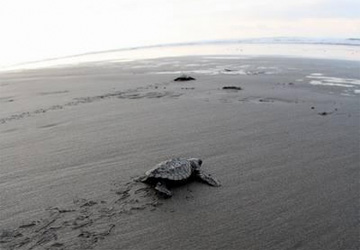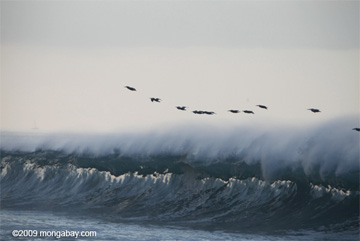Monday June 8th, 2009 is World Ocean Day, which the United Nations launched to raise awareness about oceans and coastal ecosystems.
Roughly 80 percent of life on Earth depends on oceans and coasts, while more than a third of the humanity lives in coastal areas or on small islands. Oceans provide mankind with more than $21 trillion annually in goods and services, including food, energy, transportation, and recreation.
But oceans and coastal ecosystems are increasingly under threat from pollution, unsustainable fishing practices, destruction of habitats, and the effects of increased carbon dioxide emissions (warmer temperatures and ocean acidification).

|
In recognition of the importance of maintaining healthy marine ecosystems, The Nature Conservancy is offering a set of ten tips to help to protect these resources for future generations.
“World Ocean Day was established by the United Nations to help create awareness about our seas, their importance to people, and the growing threats they face,” said Lynne Hale, director of The Nature Conservancy’s global marine program. “Recent studies about the threatened state of our oceans serve as an important reminder there are small and tangible steps that each of us can take to help reduce our impacts.”
- Reduce your plastic consumption. Plastic waste forms giant floating islands in the middle of the ocean, releasing toxins and killing sea life, including turtles, birds, and fish, which confuse plastic with food. Instead of plastic use reusable shopping bags, water bottles and utensils.
- Make informed seafood choices. Overfishing affects the majority of the world’s fisheries. Keep a copy of the Monterey Bay Aquarium’s seafood guide in your wallet or text Blue Ocean’s FishPhone to help you choose sustainable seafood at the grocery store or a restaurant.
- Dispose of chemicals properly. Never pour chemicals, pharmaceuticals, oil or paint into the drain or toilets. Check with your county’s household hazardous waste program to properly dispose of or recycle chemicals and keep them out of rivers and oceans.
- Choose environmentally-friendly detergents and household cleaners—or make your own! Besides being better for your own health, these products are safer for the environment since what goes down the drain can end up in our oceans.
- Do background research on beach-holiday retreats. Before you stay in a hotel on the coast, ask staff what happens to their sewage and swimming pool water, and if they source their restaurant fish from sustainable sources.

- Find out the source of your food. Buying local, organic food reduces your carbon footprint, supports the local economy and reduces the amount of pesticides and fertilizers that end up not just in your stomach, but as run-off in rivers and oceans, too.
- Plant your yard with native species. Reducing the amount of grass in your lawn by planting native shrubs and flower beds will provide a better habitat for birds and other wildlife and require far less water and fertilizer, which can seep into the oceans.
- Keep your beach visit clean. When visiting the beach, stay off fragile sand dunes, take your trash with you and leave plants, birds and wildlife for everyone to enjoy.
- Choose alternatives to coral. Don’t consume coral products, including jewelry or accessories for your saltwater fish tank.
- Celebrate oceans. Participate in activities that restore and celebrate oceans. Support organizations that work to protect oceans
Related articles
Marine scientist calls for abstaining from seafood to save oceans

(06/08/2009) In April marine scientist Jennifer L. Jacquet made the case on her blog Guilty Planet that people should abstain from eating seafood to help save life in the ocean. With fish populations collapsing worldwide and scientists sounding warnings that ocean ecosystems—as edible resources—have only decades left, it is perhaps surprising that Jacquet’s call to abstain from consuming seafood is a lone voice in the wilderness, but thus far few have called for seafood lovers to abstain.
Shortsighted recommendations to eat more fish ignore large-scale environmental impact

(03/16/2009) Recommendations by international health agencies, doctors, nutritionists, and the media to consume more fish for better health ignore the fact that fish stock are collapsing worldwide, reports a new study published in the Canadian Medical Association Journal. “Even at current levels of fish consumption, fisheries globally have reached a state of severe crisis. Already, the demand from affluent and developing economies, particularly newly affluent China, cannot be met by the world’s fisheries,” states the new report.
How to save the world’s oceans from overfishing

(07/08/2007) Global fishing stocks are in trouble. After expanding from 18 millions tons in 1950 to around 94 million tons in 2000, annual world fish catch has leveled off and may even be declining. Scientists estimate that the number of large predatory fish in the oceans has fallen by 90 percent since the 1950s, while about one-quarter of the world’s fisheries are overexploited, depleted, or recovering from depletion. Despite these dire trends, the situation is changing. Today some of the world’s largest environmental groups are focused on addressing the health of marine life and oceans, while sustainable fisheries management is at the top of the agenda for intergovenmental bodies. At the forefront of these efforts is Mike Sutton, director of the Monterey Bay Aquarium’s conservation program: the Center for the Future of the Oceans. The aquarium, which has long been recognized as one of the world’s most important marine research facilities, is pioneering new strategies for protecting the planet’s oceans. Sutton says the approach has four parts: establishing new marine protected areas, pushing for ocean policy reform, promoting sustainable seafood, and protecting wildlife and marine ecosystems.














